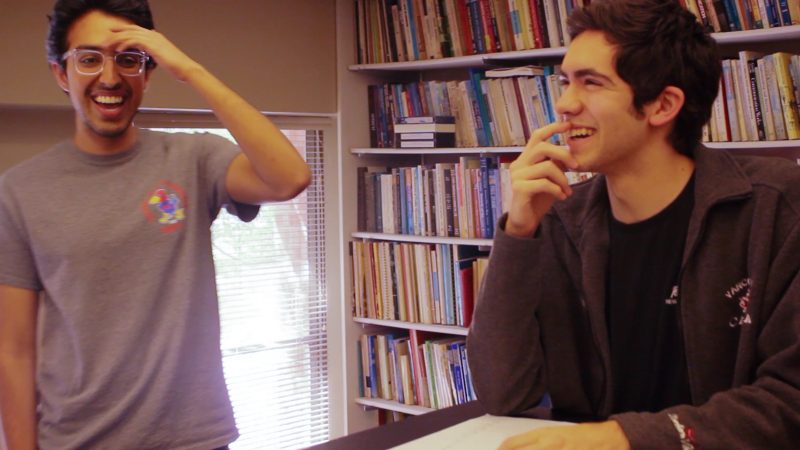For Trinity sophomores Ian Dill and Ansh Khullar, spring break was no break at all. Instead of kicking back and watching TV or going on vacation with their families, the two students spent almost a full week on campus, waking up to breakfast tacos and working long days to prepare for the national debate tournament.
The team’s primary task over the break was preparing for the final, national tournament at Kansas State University this Friday, March 23. In addition to improving their arguments and proving themselves as a team, Dill and Khullar’s goal is to make the top 10 partnerships in the nation.
“It would mean a lot [to be in the top 10],” Khullar said. “Every part of the process that we put in is inherently valuable, but it would be nice to see that materially manifested, and I guess [to receive] the recognition that our work paid off.”
This year, the national tournament’s topic is a timely one: health insurance. Should the government mandate insurance? Provide it for all in a single-payer program, as Bernie Sanders has suggested? Or should the government play no role at all?
Debate coach William Mosley-Jensen explained that even though the team focuses on a sole topic for a whole year, there is so much research to examine that the topic doesn’t get old.
“What ends up happening is you explore it in great depth and detail,” Moseley-Jensen said.
All of that research takes time and sacrifice. This break, Dill and Khullar had a short respite from Saturday, March 10, to Monday, March 12, but were back on campus the following Tuesday through Sunday to work.
Their typical days at Trinity over spring break began by discussing their opponents, such as Dartmouth and Harvard, over breakfast. Then they spent hours going through simulated speeches with those opponents, brainstorming ways to refute other schools’ positions. With the help of coaches and debate alumni, they prepared for many possible arguments.
“Arguments kind of evolve and they change,” Mosley-Jensen said. “[The opponent will] read evidence to support their conclusion from a particular source, and you might endite their source. They might endite your sources, and you have to defend them and compare them. It’s an interesting process, certainly.”
Debate preparation involves more intellectual discussion than actual argumentation. When Khullar or Dill did practice debating, they debated their coaches rather than each other. Coaches posed as the teams against which Trinity will be competing, referencing the arguments that other debate teams have posted online.
“They’re pretty good, too, and we’re out of practice,” Mosley-Jensen said. “So it’s a little bit like an old football coach getting on the field or whatever. You can demonstrate some of the principles, but it’s been a while of course.”
The Trinity team tried to get through about four opponents each day of the break. They sometimes worked until midnight, only to start all over the next morning.
Neither Dill nor Khullar regret sacrificing their time and energy for debate, however.
“The most difficult part was definitely all the work we had to put in, but in a way that was kind of the best part. The most fun and most rewarding part of the process will come at the end of it when we see that we’ve achieved a result and done really well at the tournament,” Khullar said.
Dill explained that in order for the team to be a top competitor, the spring break work week was fundamental.
“It was a big sacrifice I guess, but I think it was kind of worth it,” Dill said. “Every major team that really wants to do well at this tournament makes the spring break sacrifice, so it’s kind of necessary if you want to be part of the top 16 or so.”
The sacrifice did not end after spring break. The team left for Kansas this Wednesday night for the tournament, and will not be back to Trinity until next Tuesday, March 27. Dill and Khullar said professors were understanding about their missing so many days of class, but they will still have a large amount of work to make up when they return.
“[The time we put in] gives me a stronger sense that I really want to do well at this,” Dill said. “There’s more riding on it than one of the normal tournaments.”
Dill and Khullar felt prepared for Friday’s tournament and are looking at the challenge with optimism.
“I think we’re set up really well,” Dill said. “I mean, I remember going up against some of these schools which have huge coaching staffs and budgets — Northwestern, Harvard, Emory and Dartmouth and the like — but anyone can win these tournaments. We’re not outclassed by these people. It’s an exciting prospect to do well and beat some of these Ivies.”













